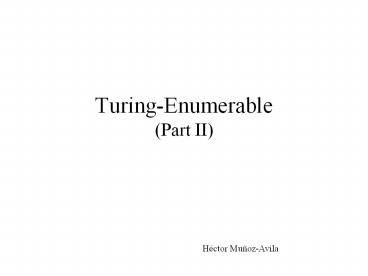Turing-Enumerable (Part II) - PowerPoint PPT Presentation
Title:
Turing-Enumerable (Part II)
Description:
Title: Turing Machines Author: Lehigh Last modified by: Hector Munoz-Avila Created Date: 11/7/2001 2:36:40 AM Document presentation format: On-screen Show – PowerPoint PPT presentation
Number of Views:114
Avg rating:3.0/5.0
Title: Turing-Enumerable (Part II)
1
Turing-Enumerable(Part II)
Héctor Muñoz-Avila
2
Enumerability and Turing Machines
Definition A language L is Turing-enumerable if
there is a Turing machine that enumerates all
words in L in its tape (and will run forever if L
is infinite)
?w1? w2? w3?
Theorem 1. If a language L is decidable then L is
Turing-enumerable
Theorem 2. If a language L is Turing-enumerable
then L is semi-decidable
3
? is Enumerable
Lemma. If ? is finite then ? is enumerable
Homework for Monday, Nov. 29. Construct the two
Turing machines Such that ? gets
enumerated ?a?b?aa?ab?ba?bb?
4
Decidable Implies Enumerable
- Let L be a language over the alphabet ?
- If L is decidable there is a Turing Machine that
decides M - Let ? be the Turing machine that enumerates
? - Construct a 3-tape Turing machine that enumerates
L as follows
- M will output words on the 2nd tape
- Every time M outputs a word w, it is copied in
the 3rd tape, where M checks if w is in L - If w is in L, then w is appended to the end of
the 1st tape
5
Enumerable Implies Semi-decidable
- Let L be a Turing-enumerable language
- Thus, there is a Turing machine M that enumerates
words in L - We can construct a 3-tape Turing machine ML that
semi-decides if a word w is in L as follows
- Put w in the first tape
- Run M enumerating all elements in the 2nd tape
- Every time a new word w is added to the second
tape, we copy it to the 3rd tape - If w w then halt otherwise continue with Step 1































